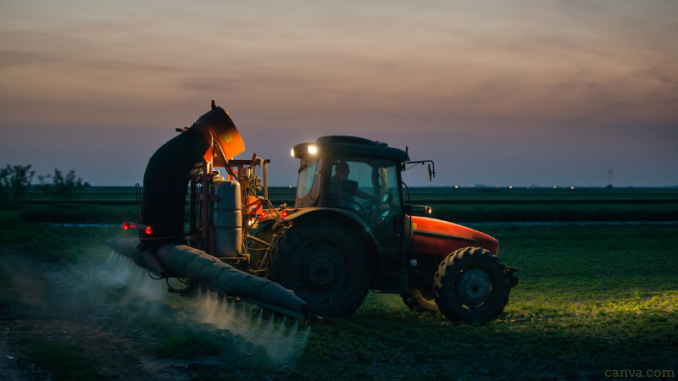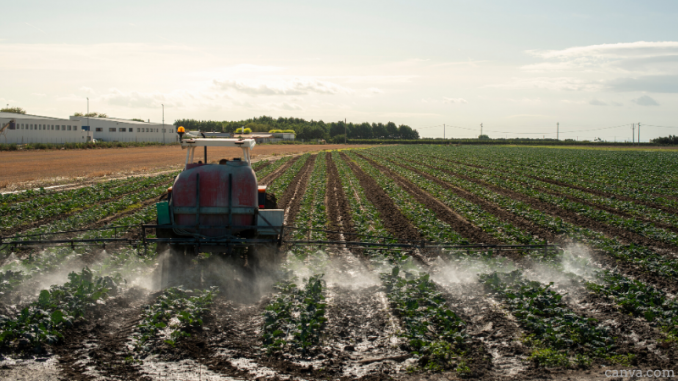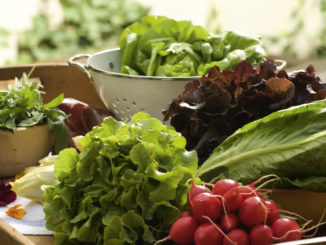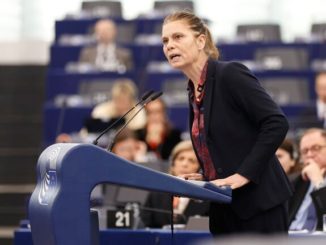 The way forward is for farmers to embrace the ecological transition that the European Green Deal is proposing and to use Integrated Past Management to work with – not against – nature. But a number of Member States are actively working against pesticide reduction, reveals Pesticide Action Network Europe.
The way forward is for farmers to embrace the ecological transition that the European Green Deal is proposing and to use Integrated Past Management to work with – not against – nature. But a number of Member States are actively working against pesticide reduction, reveals Pesticide Action Network Europe.
European Council documents acquired by Pesticide Action Network (PAN) Europe and its members show that Austria takes an open and direct position in the Council of Agriculture Ministers against the EU Commission’s strategy aimed at reducing pesticide use by 50 percent by 2030. Indirect criticism of the Commission’s 50% reduction target was expressed by Lithuania and Ireland. The other Member States have so far taken no position or expressed neutrality on this issue.
Gaining access to documents under the public right to access EU documents, PAN Europe, in cooperation with GLOBAL 2000, scrutinized the positions of Member States within the Council of the European Union’s Working Party on Agricultural Questions.
These documents are part of a draft conclusion currently prepared by the Council, as a response to a Commission report criticising Member States for the poor implementation of the Directive on the Sustainable Use of pesticides (SUD). In particular, the European Commission argues that national implementation plans lacked clearly defined and result-oriented objectives to reduce the risks and impacts of pesticides on human health and the environment. The European Commission also announced in this report its intention to revise the SUD to reduce the use and risk of chemical pesticides by 50% by 2030, thus implementing the pesticide reduction target of the European Green Deal.
However, the documents reveal a clear gap between the Commission’s ambitions and the rest of the EU Council. The German EU Presidency, for example, doesn’t acknowledge EU member states’ grave lack of effort in implementing pesticide legislation and instead offloads the responsibility on the Commission. Only very few Member States seem ready to engage and materialise the European Green Deal’s ambition of a more sustainable EU economy.
As for the Member States:
- France is the only one to have proposed the inclusion of a reduction target into the SUD revision but insists on using an inappropriate indicator,
- France, supported by Sweden, proposes to expand the SUD to include pollinator protection
- Portugal recognises – as we read it – the need to upgrade the rules on the Common Agricultural Policy (CAP) to make sure mandatory Integrated Pest Management (IPM) becomes part of the standard CAP payments, while France recognises that the various CAP instruments should be aligned to be able to encourage the needed pesticide use reductions.
“This whole process, which happens behind closed doors, is unproductive and wrongly done. EU Citizens have a right to know that the German presidency decided, of its own accord and under the pretext of neutrality, to avoid the 50% pesticide reduction debate, and deprive EU Citizens to benefit from better food, unpolluted water and a sustainable environment” says Henriette Christensen, senior policy officer for PAN Europe.
“By opposing the EU’s pesticide reduction target, the Austrian Ministry of Agriculture is acting as spearhead of the international pesticide lobby in Brussels. This is unacceptable and deeply shameful“, says Helmut Burtscher-Schaden of the Austrian environmental protection organisation GLOBAL 2000. “We call on the responsible Minister Elisabeth Köstinger to correct this disastrous agricultural policy course immediately“.
Background
- Directive 2009/128/EC aiming to achieve sustainable use of pesticides in the EU (SUD) was adopted in 2009 with the aim to reduce the risks and impacts of pesticide use on human health and the environment and promoting the use of integrated pest management and of alternative approaches or techniques such as non-chemical alternatives to pesticides to reduce dependency on the use of pesticides.
- As part of the implementation member states of the EU were obliged to establish National Action plans (NAP) in 2013 to reduce risk to set up their quantitative objectives, targets, measures and timetables. PAN Europe has prepared several reports, studying the NAP, highlighting the bad implementation by Member States, for instance this report.
- The European Commission prepared a report in 2017 commenting on the lacking implementation encouraging Member States to revised their NAPs accordingly, but as the report that the European Commission prepared in 2020 shows this has not happened.
- The 2020 report from the European Commission is among others based on conclusions from audit undertaken in 2018-19, to Austria, Bulgaria, Cyprus, France, Greece, Hungary, Ireland, Lithuania, Portugal, Romania, and Spain.
- The European Parliament prepared a REPORT on the European Commission’s first SUD evaluation, the European Council did a round table of ministers to welcome the report but no official ‘Council Conclusion’ were prepared.
- The European Court of Auditors prepared in 2020 several special reports highlighting the failure of EU pesticide regulation, first did a report concluding that there has been ‘little progress’ in the implementation of the SUD, then a report concluding failings in EU actions to protect biodiversity (in particular pollinators).
- In December 2019, the European Commission presented its European Green Deal aiming at making EUs economy sustainable.
- In May 2020 the European Commission published the biodiversity and farm-to-fork strategies on 20 May 2020. Both strategies envisage as a central measure a 50 percent reduction in the use and risk of pesticides throughout Europe by 2030, as a follow up to the response that the European Commission gave to the 1,3 million EU citizens who signed the European Citizen Initiative ‘Ban glyphosate and protect people and the environment from toxic pesticides’.
- On 25 May 2020, the European Commission sent its report to the 27 EU Member States and the European Parliament. The Commission report concludes that the aim of revising the SUD includes the 50% reduction in use and risk of chemical pesticides by 2030 target.
- In June, the European Parliament decided not to make a report this time, but instead react to the EU strategies.
- In July 2020, the German Presidency surprisingly decided to put the response to the EC report on the Council agenda – and make it the subject of a political consultation process ask all EU Member States to reflect on following questions of relevance to the SUD: Do you have general comments regarding the conclusions of the Commission especially regarding their completeness and their conclusiveness? How can the implementation of the integrated pest management be improved? Based on these replies the German presidency prepares an initial text for ‘proposal for Council Conclusion without making references to the 50% use reduction target.
- The decision-making process in the Council is currently still ongoing and should be completed before the end of the year according to the plans of the German Council Presidency, was the subject of a request for documents to be issued by PAN Europe and G2.
Conclusion
The latest draft that we have seen does not recognize the negative influence of pesticides on biodiversity, despite hundreds of studies making that link (including Geiger et al. 2010, Beketov et al. 2013, Pelosi et al. 2013, Woodcock et al. 2017, Sanchez-Bayo and Wyckhuys, 2019) most recently echoed by the European Environment Agency’s report on the State of Nature in the EU 2020.
Instead it argues that the farming sector is already delivering biodiversity benefits and that moving towards another system will become too expensive by saying ‘HIGHLIGHTS that IPM is to a certain extend already part of today’s farming’ and ‘STRESSES that incorporating alternative methods and technologies on farm level also requires adaptation and adequate investment and demonstration while that further changing practices it should not lead to a disproportionate economic burden for farmers’. This actually means that Member States are very happy with the extent of the decline in biodiversity despite the clear evidence of collapse.
This is an extremely serious situation. Not only for Europe’s citizens, animals and plants but also for the farmers themselves. Several researchers have been trying to put a value on the activity of insect-provided ecosystem services. Pollinators add a value of US$215 billion per annum to crop production (Gallai et al. 2009), while the economic value of natural pest control has been calculated to represent a global annual value of 400 billion US$ per year (Costanza et al. 1997). The present trajectory of biodiversity loss means that in Europe this gift of nature is now almost gone.
Actually, it seems that neither the German presidency nor several Member States actually understand IPM. They don’t understand that IPM is a systematic approach to crop production requiring all parts to function together. They don’t understand the huge progress made across several greenhouse crops, orchards and vineyards. They aren’t taking the time to see the huge strides towards IPM by those arable farmers who have already made progress despite their own lack of ambition. They don’t understand that the present high input/high output system of farming exposes farmers to severe financial risk and they don’t understand that because of careful soil, land and crop focus of IPM, farmers undertaking it actually are less exposed to losses.
In reality, pesticide use compromises natural pest control which, in turn, increases pesticide dependency. In agriculture, the vast majority of potential pests are controlled naturally by insect predators, such as ladybirds or parasitic wasps. When these beneficial insects are eliminated, through habitat loss or pesticide use, pest problems are seriously aggravated. To break this negative spiral, the agroecosystem needs to be diversified so that populations of natural pest enemies can regenerate and protect crops from pest damage. Largescale projects in the Netherlands and the UK have shown that conventional farmers who developed landscape structures targeted to insects providing natural pest control could reduce pesticide use by 90% while yields were maintained or even increased.
The way forward is for farmers to embrace the ecological transition that the European Green Deal is proposing and with this stop killing towards managing pests in an approach of working with – not against – nature. IPM is a part of EU legislation because EU policy, even at heads of government level, recognises its vital role. Incredibly, Member States, seem incapable of understanding this.

Material and Methods
At the request of PAN Europe on 24 September 2020 asking access to Working Paper (WK 8636/2020 INIT) ‘Council Conclusions on the REPORT FROM THE COMMISSION TO THE EUROPEAN PARLIAMENT AND THE COUNCIL’ on the experience gained by Member States on the implementation of national targets established in their National Action Plans and on progress in the implementation of Directive 2009/128/EC on the sustainable use of pesticides and all relating documents.
The General Secretariat of the Council (GSC) informed PAN Europe on the 9 November that they had examined the request and identified 36 documents from 25 May until 6 November 2020. GSC sent 10 documents to PAN Europe on 9 November, and after a reminder from PAN Europe, the remaining documents arrived on 25 November.
These 36 documents are briefly described below and made available via web link, below:
On 16 July, the German Presidency of the Council informed the other Member States in a letter of its intention to submit two Commission reports to the Council. These are the report (SUD) and the report (REFIT).
A first online kick-off meeting was scheduled for 22 July with a presentation from the European Commission, following which delegates were invited to send general comments on the Commission’s conclusions, in particular with regard to their completeness and consistency, as well as proposals for improving the implementation of Integrated Pest Management to the German Presidency by 21 August.
The following Member States had submitted comments and proposals to this effect: the Netherlands(25.08.), Luxembourg(26.08.), Austria(26.08.), Denmark(26.08.), Estonia(26.08.), Ireland(26.08.), Portugal(26.08), Finland(26.08.), Slovenia(26.08), Greece(26.08.), Poland(26.08) and France(23.09.).
On 28 August the German Presidency informed member states about the time table of the Commission work.
On 14 September, the German Presidency presented a first draft of the Council conclusions on the Commission report inviting member states to a video conference to discuss this draft with Member States in a meeting on 22 September. Following this videoconference, the Presidency invites Member States to submit their comments and proposed amendments in writing by 9 October.
The following Member States had submitted comments and proposals to this effect:
Sweden (15.10, ADD 1 REV 1), Poland (7.10, ADD 2), Denmark (8.10, ADD 3), Latvia (9.10, ADD 5), Lithuania (9.10, ADD 6), Finland (12.10, ADD 7), France (21.10, ADD 8 REV 1), Hungary (14.10, ADD 9), Netherlands (16.10, ADD 10) and Slovakia (19.10, ADD 11).
On 26 October sent a revised draft of the Council conclusions (WK 8636/2020 REV 1). On 29 October the European Commission comments on the draft of the Council conclusions (ADD 12).
Until the 6.11 (end of our access to request) the following Member States had submitted comments and proposals to this effect: Sweden (4.11, REV 1 ADD 1), Austria (4.11, REV 1 ADD 2).
So, in the period from May to 6 November:
- Germany, Cyprus, Malta, Croatia, Spain, Italy, Romania, Belgium, Bulgaria and Czech Republic did not contribute to the SUD debate.
- Luxembourg, Greece, Hungary, Ireland, Estonia, Portugal, Slovakia, Slovenia, Lithuania, Latvia, only contributed once, either replying the questions from the German presidency or proposing changes to the German presidency drafts for Council Conclusions.
- Denmark, Sweden, Austria, France, Poland, Finland, Netherlands contributed both by replying to questions from the German presidency and proposing changes to the German presidency drafts for Council Conclusions.
Analysis of the documents
The German presidency neither asked questions to the Member States nor included any reference in the proposal for draft Council Conclusion regarding the 50% pesticide reduction targets proposed by the European Commission in Farm to Fork and the Biodiversity Strategy, despite the Commission report mentioning that specifically.
A few Member States are trying to improve the German presidency text as follows:
- France is proposing to link the SUD revision to the discussions on the quantitative use targets, but proposing to use as indicator the controversial indicator (Harmonised Risk Indicator 1, HRI1). Lithuania, Ireland and Portugal refer to the Farm to Fork in their reactions recognising that changes are needed.
- France, supported by Sweden, proposes to expand the scope of the SUD to also target pollinators in the upcoming revision of the use the SUD.
- Denmark is highlighting the potential that pesticide taxation has as an economic incentive to reduce pesticide use.
- France agrees with the European Commission about the poor monitoring of IPM and that there is still a significant potential to reduce risk through the wider adoption of IPM practices including the more widespread adoption of non-chemical pest control techniques.
- France explicitly mentions the potential of agro-ecology and calls on the EU to harmonise arrangements aimed at monitoring and controlling IPM implementation, this is echoed by Luxembourg and Austria calling for the SUD should be amended accordingly, proposing a common approach or an IPM baseline, to be respected equally in all the Member States.
- Portugal recognises that IPM elements of the SUD are considered as statutory management requirements of the future Common Agricultural Policy (CAP) and that relevant IPM indicators are progressively included as part of the common conditions that farmers should comply to benefit from direct payments under the various income support schemes, while France recognises that possible extra charges due to implementation of IPM, different tools could be mobilized, including the incentives of the CAP.
- Latvia and Sweden call on the European Commission to collect and compile the results of research projects on sustainable plant protection to promote widespread application.
- Luxembourg mentions that criticism of HRI1 should be taken into account and that the trend of decreasing risks as shown by the HRI1 is not due to changes in actual PPP use patterns, but to the non-renewal of approval of active substances that meet the cut-off criteria; meaning that the target of 50% risk reduction by 2030 could therefore be met by simply further withdrawing or not renewing the approval of such active substances, without any change in PPP use patterns and all member states, recognise the importance of further developing the indicators to measure the quantitative use targets.
Instead a number of Member States are watering down the text:
- Netherlands, supported by Austria, argues that uptake of alternatives is always more expensive- Aside from the fact that farmers can be compensated within the CAP, alternative practices might seem like a cost in the short run, but over time can become a benefit.
- Denmark points at precision farming – rather than agronomy – as the key in in the IPM implementation. This is supported by Portugal even asking to ‘further discuss the appropriate legal frame of precision agriculture technologies such as the use of drones in the application of plant protection products and work towards demonstrating that the use of low flying drones is an effective mean of reducing exposure and environmental risks in comparison to other aircrafts’.
- Majority of Member states focusing on productivity rather than on farmers income and negative externalities in the pesticide debate, illustrated by the Slovenian arguing ‘The farmers economically dependent on yield cannot risk the loosing of crops if there are no efficient alternatives to be used’.
- A number of Member States defend themselves as a result of an audit rather than actually engaging in the debate, ex. Greece argues that it takes time to develop the needed supported structure able to accompany farmers in the ecological transition
- Finland, supported by other Member States, argues for need for further research rather than pointing at the many non-chemical alternatives that we already know today but are still not fully implemented.
GLOBAL 2000 and PAN Europe have carried out a fact-check of the arguments put forward by the Austrian Ministry of Agriculture against the Commission proposal: As a result, none of the arguments stood up to closer scrutiny.
For example, the Ministry of Agriculture claims that ‚‘Targets have to be realistic and many are not comparable with those of other member states’, giving the example that as ‘Austria has a very high percentage of biological farming. To increase this percentage by as a high a margin as member states with a much smaller percentage is virtually impossible.‘
But in reality the Commission’s goal is help the EU’s organic farming sector to grow, with the goal of 25 % of total farmland being used for organic farming by 2030. So, for countries having with a higher percentage of organic this objective will be easier not more difficult to reach.
Republished with permission from Pesticide Action Network Europe. Original publication here. At the original you can also download each Member State position.
More on pesticides
Show Me The Numbers – Commission Holding Back on Specifics re Pesticides, Fertilizers and Organics
Bayer Beware | Pressure on Pesticides as Green Deal Date Looms
350,000 Tonnes of Pesticides Sold in EU Each Year – Still No Clear Picture of the Risks
Pesticides under Pressure | EU Parliament and Progressive Places Putting Biodiversity First
Pesticides, Tear Gas and History | From WW1 to Today’s Streets




